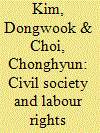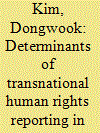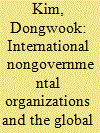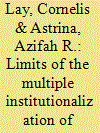|
|
|
Sort Order |
|
|
|
Items / Page
|
|
|
|
|
|
|
| Srl | Item |
| 1 |
ID:
170997


|
|
|
|
|
| Summary/Abstract |
Why do some national governments in Asia and the Pacific protect labour rights better in practice than others? This article argues that labour rights are better protected in Asia-Pacific countries where civil society organizations participate more intensively in the government's policy-making process. It goes beyond treating regime type in the aggregate and demonstrates that the associational dimension of regime type plays a critical role in shaping government protection of labour rights in Asia and the Pacific. Multivariate longitudinal analyses of all 30 Asia-Pacific countries from 1981 to 2011 find robust support for the theory, using new data on civil society participation, and controlling for electoral democracy, trade openness, economic development, unobserved country-level heterogeneity, and other factors.
|
|
|
|
|
|
|
|
|
|
|
|
|
|
|
|
| 2 |
ID:
160633


|
|
|
|
|
| Summary/Abstract |
Why do some national governments in East and Southeast Asia receive more transnational scrutiny and pressure on their domestic human rights practices than others? This article argues that transnational human rights reporting is more likely to target states where domestic activists and victims are densely connected with human rights international nongovernmental organizations (INGOs) through a local membership base. Human rights INGOs increase social demands and opportunities for transnational human rights reporting by strengthening local actors’ capabilities to leverage human rights and international solidarity as an advocacy strategy, and by mobilizing them for monitoring and information collection on the ground. Event count analyses of 25 Asian states from 1977 to 2008 find robust support for the theory, using new data on Amnesty International's human rights reporting and human rights INGOs’ local membership base, and controlling for government respect for human rights, regime type, military power, and other factors.
|
|
|
|
|
|
|
|
|
|
|
|
|
|
|
|
| 3 |
ID:
123016


|
|
|
|
|
| Publication |
2013.
|
| Summary/Abstract |
During the past three decades national human rights institutions (NHRIs) have spread to more than one hundred United Nations (UN) member states and become key to human rights enforcement and democratic accountability. Given that NHRIs can take on a life of their own even under adverse conditions, why do governments in the developing world create permanent, independent national bodies with statutory powers to promote and protect human rights? Human rights international nongovernmental organizations (INGOs) are crucial for global diffusion. They empower local actors and influence governments in favor of NHRI adoption by mediating the human rights and NHRI discourses and mobilizing shame internationally. An event history analysis offers robust evidence that controlling for the UN, regional organizations, and other rival factors, human rights INGOs have systematic positive effects on diffusion. The case studies of South Korea and Malaysia provide process-tracing evidence that the hypothesized causal mechanisms are operative.
|
|
|
|
|
|
|
|
|
|
|
|
|
|
|
|
| 4 |
ID:
170998


|
|
|
|
|
| Summary/Abstract |
This article explores the limits of the multiple institutionalization of border control within the context of the Singapore-Johor-Riau Islands (SIJORI) interregional border, providing a detailed examination of three border control institutions, i.e. immigration, customs, and the Indonesian Maritime Security Agency (BAKAMLA: Badan Keamanan Laut Republik Indonesia) in Batam, Riau Islands Province, Indonesia. This article asks why, in a region with high institutional density and rapid economic growth, illicit practices remain omnipresent, and finds that this stems from incompatible border institution design and overemphasis on individual organizational interests. We find that individual institutions' tendencies to focus on their own goals compromises the common goal of security that justifies their presence. This has been exacerbated by the historical legacy of sectoral egotism that continues to divide Indonesia's public institutions.
|
|
|
|
|
|
|
|
|
|
|
|
|
|
|
|
|
|
|
|
|